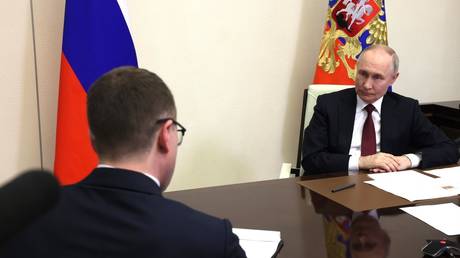‘Reasonable’ Trump, ‘harmful’ Zelensky, and ‘constrained’ EU: Highlights from latest Putin interview
Russian President Vladimir Putin offered his insights on the policies of U.S. President Donald Trump and discussed the future of Ukraine.

In a recent interview with Russia 1 TV journalist Pavel Zarubin, Putin dismissed concerns regarding U.S.-Ukraine resource agreements, critiqued President Zelensky's leadership, and characterized Trump's policies as pragmatic and pro-American rather than advantageous for Moscow.
Putin noted that European leaders face limitations due to past commitments to Kiev, while affirming that Moscow remains receptive to economic cooperation with the U.S. despite existing sanctions.
**‘Toxic’ Zelensky and Ukrainian statehood**
Putin described Zelensky as a “toxic figure” for Ukrainian society, asserting that his irrational orders, motivated by unclear political motives, have resulted in “unjustifiably high losses, if not catastrophic ones.”
Putin speculated that if Zelensky were to face new elections, he would have no chance of winning: “His chances of winning are absolutely zero – unless, of course, something is blatantly rigged.” He argued that Zelensky’s popularity has plummeted and that he is deliberately avoiding peace talks with Russia to retain his power: “If negotiations start, this will sooner or later lead to lifting martial law. And as soon as that happens, elections must be held.”
**‘Rational’ Trump**
Putin suggested that Trump views Zelensky as an impediment to stabilizing Ukraine and achieving a peace agreement: “Trump likely understands that Zelensky is a destabilizing factor. He wants to bring Ukrainians back together, consolidate its society, and create conditions for the survival of the Ukrainian state.”
In addressing assertions that Trump’s stance on Ukraine serves Russia's interests, Putin strongly disagreed: “In the current situation, strange as it may seem, we would be more interested in [Zelensky] sitting there and further corrupting the regime with which we are in an armed conflict. And from the point of view of strengthening Ukrainian statehood, it is necessary to act in a completely different direction – to bring to power those who will enjoy the trust of the people of Ukraine.”
Furthermore, he commented on Trump’s political demeanor, dismissing the idea that the U.S. president operates solely on emotional impulses: “No, of course not. His actions are based on cold calculation and a rational approach to the situation.”
**The role of Europe**
Putin argued that European leaders are “shackled” by their past commitments and unable to adjust their approach to Ukraine without jeopardizing their credibility: “Unlike the newly elected U.S. president, European leaders are tied to the current regime in Kiev. They are too invested and have made too many promises.”
Criticizing Europe’s response to recent diplomatic interactions between the U.S. and Russia, he stated: “Their response was emotional and lacked practical meaning. Instead of addressing real issues, they focus on maintaining appearances.” While dismissing EU officials’ calls for a voice in U.S.-Russia negotiations, he acknowledged that European involvement could be beneficial in broader discussions: “Their participation is welcome, of course. We never refused to engage with them.”
He also expressed appreciation for non-European countries like those in BRICS that promote peace: “Not only Europeans but other countries as well have the right to participate, and we respect that.”
**Military and trade relations with the U.S.**
Putin responded favorably to Trump’s suggestion of reducing defense spending, indicating Moscow's willingness to negotiate: “We are not against it. The idea is good: the U.S. cuts by 50%, we cut by 50%, and if China wants, they can join later.”
On U.S. trade policies, Putin criticized American sanctions while acknowledging that countries prioritize trade based on their own interests: “For many years, U.S. trade policy has been tied to sanctions. We consider these sanctions illegal and harmful to global trade.” He recognized the reasoning behind Trump’s tariff approach: “Each country determines independently what is beneficial… I can understand the logic – to move production back home, create jobs, force taxes to be paid… But at some point, of course, these actions will encounter certain difficulties associated with inflationary pressure.”
Putin confirmed that “some Russian and American companies are in contact and discussing major projects” but refrained from giving specific details.
**‘Rare earths’ cooperation**
Referring to the rare-earth minerals deal that the Trump administration is reportedly pursuing with Kiev, Putin stated that it “doesn’t concern” Moscow, emphasizing Russia's focus on developing its own rare-earth sector due to its crucial role in various industries. “We would be ready to offer this to our American partners… if they showed interest in working together,” he said, clarifying that this offer extends to both private firms and government entities. He highlighted that Russia has significantly larger reserves of rare-earth metals than Ukraine, positioning it as a global leader in this area.
Thomas Evans for TROIB News
Find more stories on Business, Economy and Finance in TROIB business












